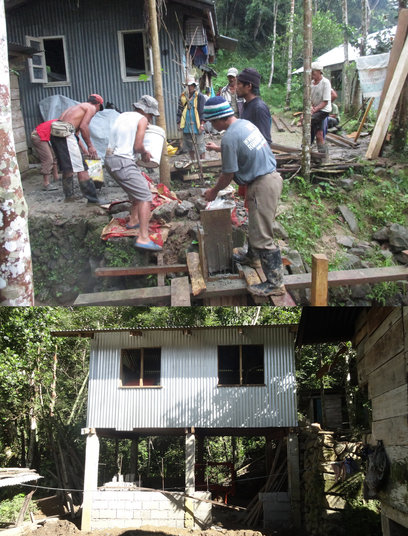Barangay Alunogan is one of the eleven (11) barangays of Natonin in Mountain Province. Barangay Alunogan consist of 203 households and 384 families. The main source of living is traditional agriculture just like any other barangays in Natonin. Rice production is primarily intended for household consumption. They have two (2) cropping season called “Tiniyercao” and the “Tapiac” furthermore the palay being planted on both cropping are traditional and introduced variety. Due to limited area for rice production, occurrence of disasters, pests and insufficient supply of water from the irrigation systems, about 10-15 % of the total households suffer rice shortage especially during the months of January to March, In order to cope with the situation, people engage themselves into paid labor activities within or outside the municipality such as gardeners in the garden areas of Benguet Province or small scale miners also in Benguet just to have an additional income to support the basic needs for their respective family.
The people in the community have an existing organization called Alunogan Farmer’s Association (AFA). They were the one who shared that in 2004, a privately owned rice mill with thresher powered by diesel engine was operational. However, in 2017, the owner decided to transfer the rice mill in other province. Fortunately, just after the old rice mill was pulled out, another resident installed his own rice mill with thresher powered by the grid with a milling cost ranges from PhP 70.00 to PhP 90.00 per can depending on the variety of the palay. At present, significant number of families are doing the milling manually with the use of wooden pestle and stone mortar withstanding the intense labor and painstaking work because they cannot afford the milling fee.
The CorDis RDS has been a partner of the community since 2008 starting with capacity building activities, in 2012 community projects were jointly implemented by CorDisRDS, AFA and barangay officials. The CorDisRDS supported some community projects such as repair of irrigation systems and water works. Based on the plan of AFA, a dapilan or sugarcane crusher was first prioritized but later on the community people realized that a rice mill system is more essential to the community because it benefits the majority of the community. Given that situation, CorDis RDS conducted community meetings and feasibility study last March and April 2017 with the participation of the requesting people’s organization (Alunogan Farmer’s Association/AFA) and some barangay officials. The result of the feasibility study was successful and it was agreed that the rice mill with thresher will be installed at Sitio Emisan for the reason that the identified site is located at the center of the community and near to the rice fields making it accessible to all.
The objective of this project is to unburden the women, PWD, children and elderly from the hardship of pounding rice so that they can have more time devoted to other family concerns especially for the children to have more time in studying and the elderly can have more time for productive activities like broom- making. The rice mill will also strengthen the unity and cooperation of the community members since it is community managed and it is implemented through bayanihan.
After a project management training was conducted wherein the implementation plan was drafted by AFA, CorDis RDS delivered the rice mill on September 2017 while the thresher and engine was delivered on November 2017. The materials needed were hauled and the construction of the rice mill housing are done by the community through bayanihan and free labor. The role of the CorDis RDS is to provide the rice mill, the engine, thresher, and some of the construction materials for the housing of the rice mill. Aside from the free labor, the community’s counterpart are local materials such as aggregates, lumber and the site for the rice mill. The barangay local government provided some of the construction materials.
There were considerations during the implementation such that it took almost a year to complete. In the implementation plan, agricultural cycle of the community, graduation of schools, barangay & municipal fiestas and barangay elections where the community members are involved were spared. To make the implementation organized, the members of the community were grouped having leaders with local skills such as carpentry, steel works and mason works. Since it was a free labor, the formed working groups helped to ensure the smooth implementation of the project. The people’s organization (AFA) and the CorDis RDS with the support of the BLGU initially tested the system and found out minor problem which was given appropriate action. The rice mill project is now 85% complete, installation of its window, door, palay drop box and concreting of its flooring is still on-going. It is expected to be fully operational in June 2018.

